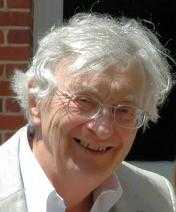Lindon Eaves
| Lindon John Eaves | |
|---|---|
 | |
| Born |
23 September 1944 (68) Walsall, Staffordshire, England |
| Residence | United States |
| Citizenship | American |
| Nationality | [US] |
| Fields | Behavioural genetics |
| Institutions | Virginia Commonwealth University |
| Alma mater | University of Birmingham, Cuddesdon College, Oxford |
| Doctoral advisor | John Jinks |
| Doctoral students | Andrew C. Heath, Nicholas G. Martin |
| Known for | Development of field of Behavioral Genetics, Statistical Modeling, Genetical Theory, Genetics of Personality and Social Attitudes, |
| Influences | Ronald Fisher, Hans Eysenck |
Lindon J Eaves (born 23 September 1944) is a behavior geneticist who has published on topics as diverse as the heritability of religion and psychopathology. His research encompasses the development of mathematical models reflecting competing theories of the causes and familial transmission of human human differences, the design of studies for the resolution, analytical methods for parameter estimation and hypothesis-testing and application to substantive questions about specific (human) traits.[1] He was the first to consider standardized variance components for heritability estimates[2][3] and was the first (at least in the human context) to consider the effect of one relative living with a relative (with a different genotype or, in the case of monozygous twins, the same genotype) would have on their own behavior.[4] Furthermore, he was the first to think about genotype x age interaction[5] and set up the algebra to study the effects of genes working in males as well as females, making it possible to use twins pairs of opposite-sex (dizygotic other sex).[6]
Together with Nick Martin, he wrote many classical papers, one of which is "The genetic analysis of covariance structure".[7] They also wrote the book, Genes, culture and personality: An empirical approach.
Early life
Lindon studied genetics at the University of Birmingham and Theology at the University of Oxford. He was Professor in the Department of Psychology at the University of Oxford (MA Oxon) until 1981, when he moved to Virginia Commonwealth University where Dr. Walter Nance and Dr. Linda Corey had established the Virginia Twin Registry. In 1996, he and Dr. Kendler founded the Virginia Institute for Psychiatric and Behavioral Genetics (VIPBG), where he is currently Professor Emeritus and actively engaged in research and training.
Honors
- 1966: First class honors in Genetics, University of Birmingham
- 1981: James Shields Award for Twin Research
- 1989: Mead-Swing Lecturer, Oberlin College
- 1991: President, Behavior Genetics Association
- 1993: Paul Hoch Award, American Psychopathological Association
- 1993-1995: President, International Society for Study of Twins
- 1996: McNair Lecturer, University of North Carolina at Chapel Hill
- 1999: Dobzhansky Award, Behavioral Genetics Association
- 1999: Nobel Lecturer, Gustavus Adolphus College, Saint Peter, MN 'Genetics in the New Millenium'
- 2000: Doctor Honoris Causa, VU University, Amsterdam, Netherlands
- 2000: Root Lecturer, Washing & Lee University, Lexington, VA
- 2001: VCU School of Medicine Outstanding Research Achievement Award
- 2001: VCU Distinguished Scholarship Award
- 2001: VCU School of Medicine Outstanding Departmental Teacher Award
References
- ↑ [Eaves LJ, Gale JS: A method for analyzing the genetic basis of covariation. Behav Genet 4(3):253-267, 1974]
- ↑ [Eaves LJ: The genetic analysis of continuous variation: A comparison of experimental designs applicable to human data. Br J Math Stat Psychol 22(2):131-147, 1969]
- ↑ [Eaves LJ: The genetic analysis of continuous variation: A comparison of experimental designs applicable to human data. 11. Estimation of heritability and comparison of environmental components. Br J Math Stat Psychol 23(2):189-198, 1970]
- ↑ [Eaves LJ: A model for sibling effects in man. Heredity 36(2):205-214, 1976]
- ↑ [Eaves LJ, Eysenck H: Genotype X age interaction for neuroticism. Behav Genet 6(3):359-362, 1976]
- ↑ [Eaves LJ: Inferring the causes of human variation (with discussion). J R Stat Soc Ser A Stat Soc 140 (3):324-355, 1977]
- ↑ [Martin NG, Eaves LJ: The genetical analysis of covariance structure. Heredity 38:79-95, 1977]